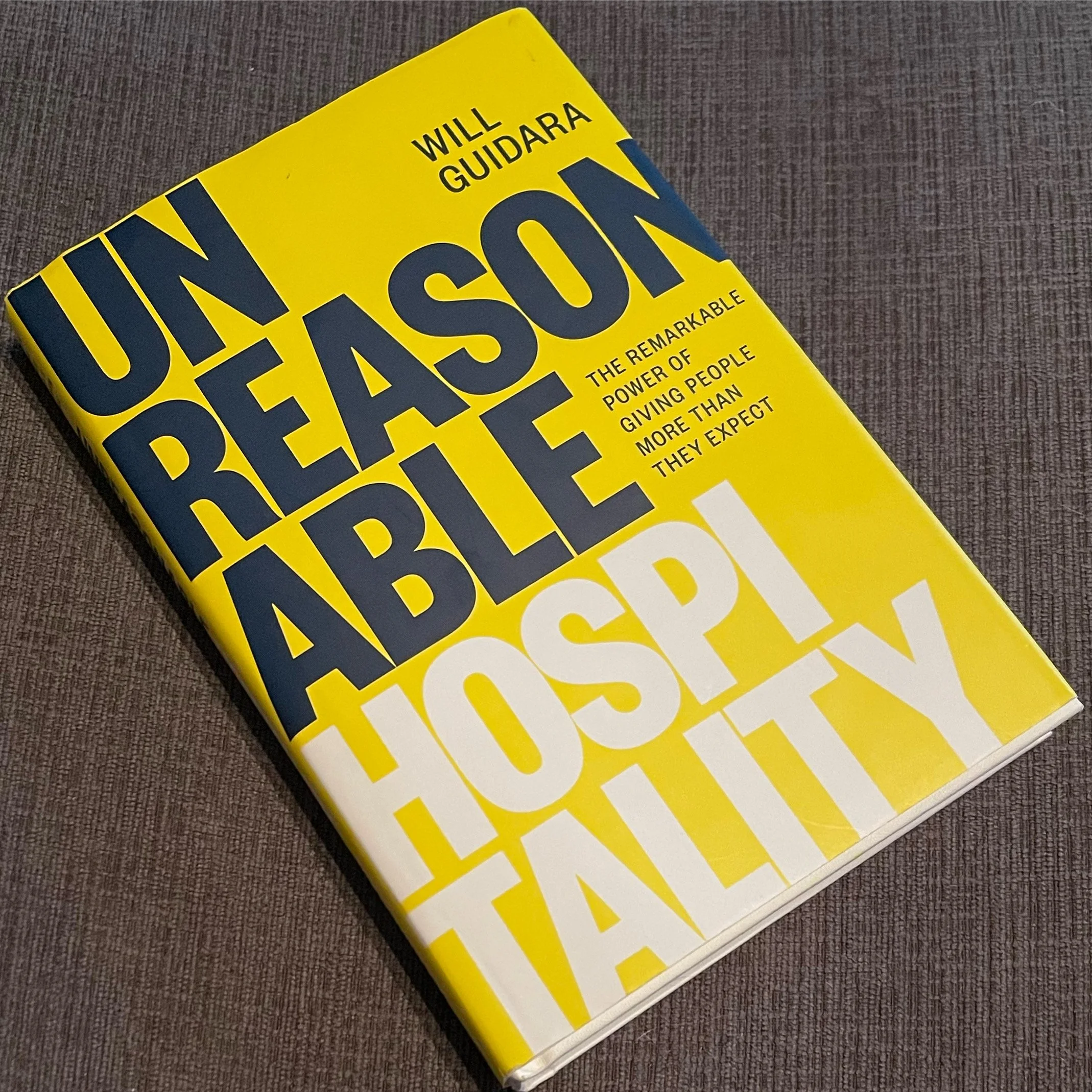Unreasonable Hospitality.
Every year, my client hosts an annual convention in Florida for all of their franchisees and a select group of partners and vendors. It’s a jam-packed few days, full of presentations, keynote speakers, and networking events and parties. This year, one of the keynote speakers was a man named Will Guidara, a restaurateur and author of “Unreasonable Hospitality: The Remarkable Power of Giving People More Than They Expect.” For over an hour he stood on stage, speaking to a room of roughly 1,500 about the stories and principles in his book and for over an hour I sat there, slowly sipping his Kool-Aid, ordering his book online while sitting there listening to him. Amazon delivered it to my door two days later and I gobbled those 289 pages up with a renewed sense of what it means to be unreasonable and how I can weave it into my everyday life more often.
There are many principles that he spoke about, and in the book, that are relevant to everyone, regardless of what industry you work in, but the general concept is this: a person or company’s success can be determined by their level of commitment to “unreasonable hospitality” which, generally, means doing more and going beyond what’s logically sensible to provide an amazing experience. It means going above and beyond, putting intention behind what you do, choosing to put guests, or in some cases, clients or employees, at the center of decision making. Will talked about attributing unreasonable hospitality as the way Eleven Madison Park, the fine dining establishment in Manhattan he managed, became the number one ranked restaurant in the world in 2017.
While the book covered lots of different subjects, anyone who knows me knows that I’m always drawn to the leadership content and this book was packed full of it. Three specific themes really resonated with me and where I’m at right now in my career – 1) approach and consistency, 2) praise and criticism, and 3) asking for help.
Approach and consistency. Your team deserves to understand what they are walking into every day. Admittedly, this one is hard for me sometimes. I wear my heart on my sleeve so it’s relatively easy to tell if I’m having a good or a bad day. But that’s not my team’s problem. In our family, the Benavidez Family Rule #1 is “Don’t make your problem my problem.” A person deserves a leader who is consistent and steady in their mood and leadership style so, making sure I don’t violate rule #1 is a big priority for me this year.
Praise and criticism. The engagement, buy-in, dedication and the general level of give-a-fuck your team gives you can often be tied back to two things; how you praise them and how you criticize them. In his book, Will talks about praising in public and with emotion and criticizing in private and without emotion. If done well, both are major investments in both that individual person as well as the team as a whole. But what I also think about when considering praise and criticism, is the level of care that I communicate when doing both things. If under it all, the person knows that you care about them, both the praise and the criticism will land better.
Asking for help. Will writes, “You can’t pour endlessly from your own pitcher without ever stopping to refill it.” As I sit here and write this, I’m currently on a solo getaway that I took to give myself the opportunity to disconnect and refill my pitcher. It’s January and I rented a little treehouse in Fredericksburg, Texas for myself for a few days, just so I could get away. He also wrote, “Being able to ask for help is a display of strength and confidence. It shows an understanding of your abilities and an awareness of what’s happening around you.” I don’t often ask for help when I’m feeling overwhelmed (because let’s face it, asking for help is hard) and my body was asking me for help, so this was my answer. If you need it, rent yourself a treehouse too.
You can see why Will made an appropriate keynote speaker for my Quick Service Restaurant client. The brilliance of what he talks about spans industries and in my mind, goes further than just providing useful tools for business. But above and beyond everything else he spoke about, I found myself thinking about how I can be unreasonable in my day-to-day life, both personally and professionally. My entire life, I’ve considered “unreasonable” a negative word. Traditionally, if a person is being unreasonable, they are being irrational or absurd. But Will changed that word for me by reminding me of the second definition of unreasonable.
Unreasonable (adjective). “Beyond the limits of acceptability or fairness.”
Here’s what I’m going choose to be unreasonable about. Unreasonable kindness. Unreasonable generosity. Unreasonable empathy. Unreasonable understanding. Unreasonable optimism. Unreasonable curiosity. Unreasonable patience. Unreasonable authenticity.
Maybe 2024 is the year we’re all a little bit more unreasonable.
For inquiring minds, here’s the treehouse I’m currently sitting in and the book that inspired it all:
Blue Sage No. 2 - “The A Frame with a Floating Twist” - Fredericksburg, Texas.

